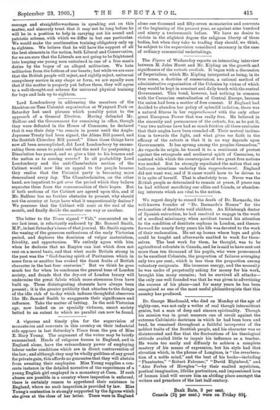The Figaro of Wednesday reports an interesting interview between M.
Jules Huret and Mr. Kipling on the growth and significance of the entente cordiale. It began with a discussion of Imperialism, which Mr. Kipling interpreted as being, in its true sense, a doctrine of conservation, a rational method of administrative organisation of the Colonies by virtue of which they would be kept in constant and daily touch with the central Government. This bond, however, had nothing in common with the Caesarian centralisation of Central Europe, because the union had been a matter of free consent. If England had decided to abandon her policy of splendid isolation, there was a natural fitness in her rapprochement with the only other great European Power that was really free. He believed in the sincerity and permanence of the entente. for, as he put it, "our two nations have had so much friction all these centuries that their angles have been rounded off. Their mutual inclina- tion is towards the light, and what gives me faith in the efficacy of the entente is that it in no way depends upon Governments. It has sprung among the peoples themselves." As regards its origin, he traced it to a sentiment of protest against the retrograde and mediaeval spirit of Caesarism, to contend with which the counterpoise of two great free nations was needed. But he strongly repudiated the notion that any bellicose intentions underlay this rapprochement. England did not want war, and if it came would have to be driven to it in spite of herself. That is absolutely true. Never was the British people so determined to remain at peace, if peace can be had without sacrificing our allies and friends, or abandon- ing interests which are vital to the nation.










































 Previous page
Previous page